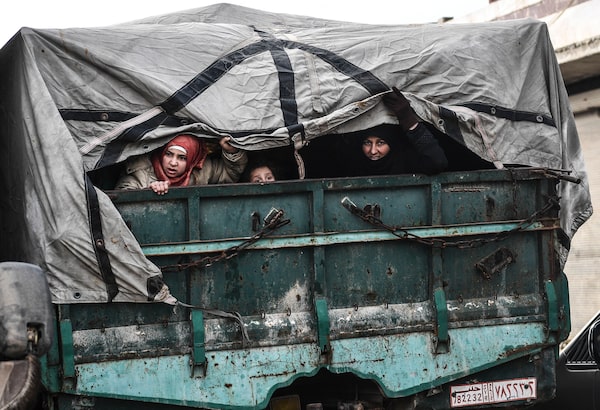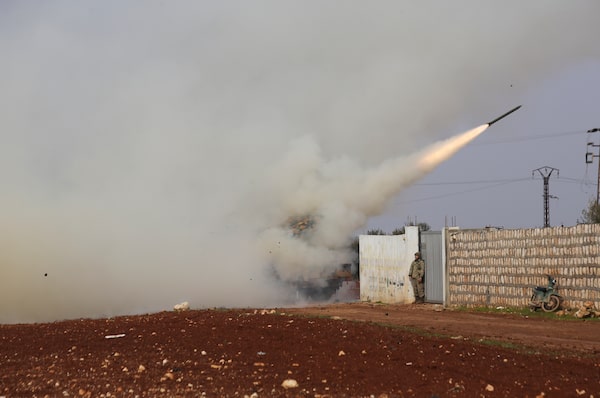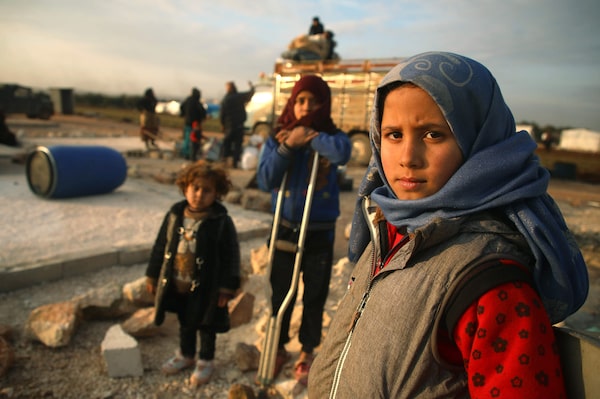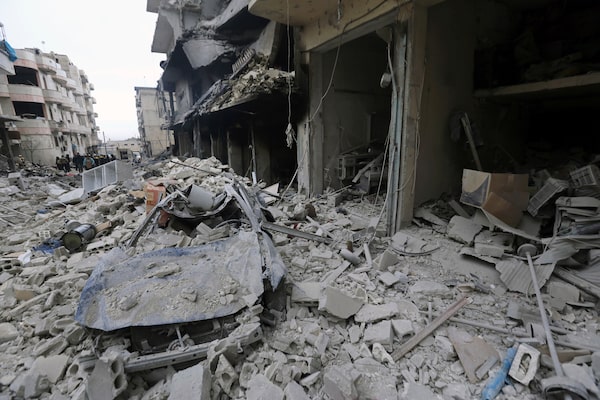Neil Hauer is a Canadian journalist and analyst writing on Russia, Syria and the Caucasus, based in Yerevan, Armenia.

Civilians flee Idlib in search of safety near Syria's border with Turkey on Feb. 15, 2020.The Associated Press
The Syrian war has been the greatest humanitarian catastrophe of our generation. Continuing for nearly a decade now, it has resulted in the near-total destruction of the country: Of a prewar population of 22 million, the UN estimates that five and a half million are now refugees, with another six million internally displaced. Rebuilding will cost an estimated US$400-billion. Food scarcity affects nearly half of the remaining population.
It is remarkable in the most horrific way, then, that the current crisis in the country dwarfs all of this. The target: the northwest Syrian province of Idlib, home to more than four million civilians, many of them displaced to there by violence elsewhere, crammed into a territory the size of Prince Edward Island. Over the past few weeks, the Syrian regime and its Russian and Iranian allies have stepped up their months-long offensive on Idlib, the last bastion of opposition control in the country. Brazenly ignoring the lines of control agreed with Turkey last September, Russia has conducted a full-scale air campaign in support of pro-government Syrian militias. Beleaguered opposition fighters have ceded roughly one-third of the territory under their control to pro-regime forces in the past month.

Turkish soldiers fire a missile at a Syrian government position in the province of Idlib on Feb. 14, 2020.Ghaith Alsayed/The Associated Press
The scale of the onslaught has been immense. Russian and Syrian aircraft are carrying out dozens of air strikes every single day. Hospitals, bakeries and markets have been bombed. Intercepted communications confirm that Russian and Syrian forces are intentionally targeting civilians. Now, Russian jets are openly striking Turkish military positions, seemingly with no intention of even disguising their actions, as they push forward toward the civilian masses trapped between the front line and the Turkish border. On Thursday, it was reported that 22 Turkish soldiers had been killed in an air strike. Turkish forces are overmatched and cannot hope to face down Russia without political and military support.
The notion that Russia is a responsible international power that can be negotiated with in good faith, or that it remotely cares about human rights, should have been dashed to the rocks over the past few years of the Syrian and Ukrainian wars. Realistically, it should have been viewed with extreme skepticism from the start. In Syria, Russia has killed more civilians than the Islamic State, a remarkable achievement.

Syrian children and their families prepare to flee a camp for the displaced, east of Sarmada in northwestern Idlib province, on Feb. 16, 2020.AAREF WATAD/AFP/Getty Images
Against this background, the United States, Canada and the North Atlantic Treaty Organization need to openly support Turkey politically and militarily, in defending the shrinking enclave of non-Assad-held territory in northwest Syria. NATO ground forces should be deployed to the area, at least in a symbolic capacity, while Syrian regime forces should be subjected to air strikes should they continue to advance. There is nine years’ worth of proof that Syrian President Bashar al-Assad will not negotiate or moderate, and five years of evidence that Moscow cannot or will not restrain him. This is not about Ankara’s character: Turkish President Recep Tayyip Erdogan’s administration is abhorrent and itself no friend to human rights. This is about looking beyond the political inconveniences of the moment to the past “red lines” in Syria that the Obama and Trump administrations allowed to be overrun virtually without consequence, and the bloody results that ensued.
There is a much-repeated trope on Syria that it is not the West’s problem, that there is no “military solution” and that the U.S. and others have no right to intervene. This false assumption misses the point: Western inaction is not a neutral choice, but an actively negative one, one that allows Moscow, Tehran and Damascus to continue imposing their own military solution on the war. The scale of the impending disaster cannot be overstated. The fall of Idlib, the last major regional population centre outside Mr. al-Assad’s control, will make the atrocities in the war to date look like child’s play. The only realistic hope to prevent mass slaughter on a scale not seen in the 21st century is for the U.S. and NATO to stand with their Turkish ally, despite the rocky relationship the two sides have had in recent years, and forcefully halt the Russian/Syrian advance. To not do so is to condemn thousands, perhaps tens of thousands, to a violent death.

People inspect a damaged site after air strikes on the town of Ariha, Syria, on Jan. 30, 2020.Ghaith Alsayed/The Associated Press
Keep your Opinions sharp and informed. Get the Opinion newsletter. Sign up today.